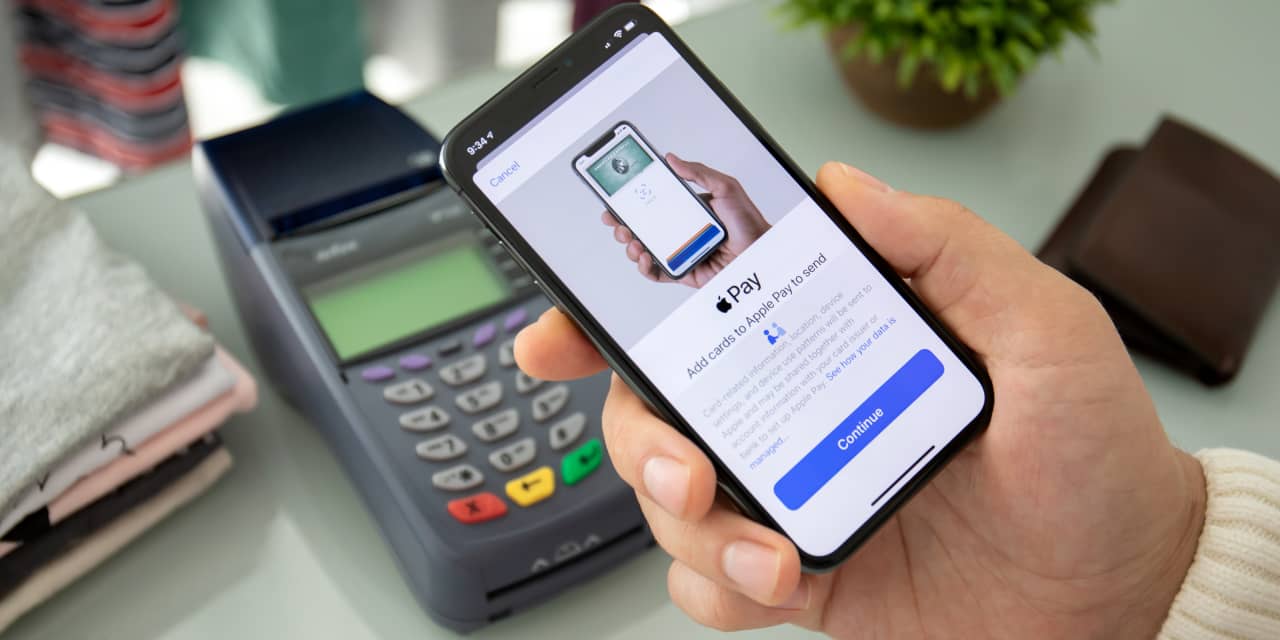Apple
annual iPhone upgrades, launched Tuesday, promise an array of hardware and software goodies in new models.
Left unsaid in the company’s presentation was that
Apple
(ticker: AAPL) has been quietly growing into a “fintech” giant with its Apple Pay digital wallet—posing more competition to rivals in payments while keeping iPhone users in the Apple ecosystem and additional reasons to keep buying new models.
Apple Pay launched in 2014 but has only taken off in recent years. Apple Pay is a digital wallet that can store credit cards and Apple’s own card, co-branded with
Goldman Sachs
(GS). IPhone users can pay for items in stores through contactless terminals or use Apple Pay online.
Apple Pay processed $600 billion to $700 billion in payments in 2022, estimates MoffettNathanson analyst Lisa Ellis. It’s also gaining market share in online “branded” checkout (seeing Apple Pay as an option for a payment), she wrote in a note on Tuesday.
Apple Cash—a P2P platform and cash back service—hasn’t been so successful, she writes, and its Apple Card has been only a modest hit with 7.5 million users.
Apple is hardly sitting still in payments and other areas of fintech. It launched a high-yield savings account in April, also with
Goldman Sachs,
and that now has more than $10 billion in deposits, offering yields of 4.2%, Apple said in August.
None of this may move the needle on Apple’s revenue base, estimated at $389 billion this year, according to consensus forecasts. But it gives iPhone users another reason to stick with the device and upgrade to new models out of sheer convenience.
It also spells trouble for incumbents in the payments space. Apple’s ever-increasing number of financial products, including Apple Pay Later and Apple Cash are housed on the number one mobile-device operating system in the U.S.
While iPhone users can download apps such
PayPal
and Venmo, offered by
PayPal Holdings
(PYPL), and Cash App, from
Block
(SQ), the level of ease of using an Apple app on Apple hardware could be more glue for Apple and less stickiness for rivals.
“Apple has emerged as the most formidable Big Tech player in Payments, due to its scale, commitment, resources, and affluence of its user base,” Ellis said in her note.
Apple did not immediately respond to a request for comment.
Among payments companies, Apple’s dominance is “most directly negative” for PayPal, Ellis wrote. The two compete most on PayPal’s “branded” checkout button as Apple Pay becomes increasingly available. Meanwhile, PayPal has only seen mid-single digit growth in its branded checkout button over the last three quarters.
Ellis sees Block facing a “modest negative” from Apple as the two compete most directly on buy now, pay later offerings with Block having Afterpay and Apple having Apple Pay Later.
PayPal and Block did not immediately respond to requests for comment.
Similarly,
Affirm Holdings
(AFRM), another player in the “buy now, pay later” space, is expected to only experience “modest negative” pressure from Apple so long as Apple focuses on ‘pay-in-4’ loans. While Affirm’s pay-in-4 product attracts a lot of attention, its longer-duration loans account for three quarters of its gross merchandise volume.
Legacy payments companies face less of a threat from Apple, Ellis writes.
Visa
(V) and
Mastercard
(MA) face “low” threats as Apple still uses the card networks for payment authorization, clearing and settlement. While the two should be aware of Apple’s growing influence in financial services, she believes the relationship will “remain positive and mutually beneficial.”
American Express
(AXP) could benefit from Apple as Ellis sees opportunities for the two to collaborate on an overlapping, high-end client base. She also sees the possibility of Amex replacing Goldman Sachs (GS) as Apple’s bank partner, which would be a “powerhouse combination.”
Goldman Sachs and American Express did not immediately respond for a request for comment.
Given the pressures, investors appear to have soured on payment stocks, while giving Apple some credit for its fintech growth. While Apple’s stock has retreated lately, it is still up 35% this year. PayPal is down 11.8% and Block is off 13.5%.
Write to Carleton English at carleton.english@dowjones.com
Read the full article here













Leave a Reply